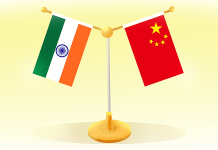
In a significant diplomatic development, Indian Prime Minister Narendra Modi and Bangladesh’s Chief Advisor Muhammad Yunus met for their first bilateral talks on the sidelines of the sixth BIMSTEC Summit in Bangkok. This crucial dialogue follows a period of strained relations between the two neighboring nations, particularly after the political transition in Bangladesh that saw former Prime Minister Sheikh Hasina seek asylum in India.
In This Article:
A Diplomatic Turning Point
The meeting between Modi and Yunus marks a turning point in the Indo-Bangladesh relationship, which has seen tensions escalate due to multiple factors. India’s decision to provide asylum to Hasina after mass protests led to her removal created friction between the two governments. Additionally, Yunus’s comments on India’s northeastern states during his visit to the Boao Forum for Asia in China further intensified diplomatic sensitivities.
With these challenges in the background, the bilateral engagement aimed to reset relations and pave the way for stronger cooperation in trade, security, and regional stability.
Key Discussion Points
1. Security and Minority Protection
A core agenda in the discussions was the safety of Hindu minorities in Bangladesh. Reports of sporadic violence against Hindu communities had raised concerns in India, prompting Modi to emphasize the need for effective protection measures. Bangladesh assured India of stringent actions to curb such incidents and reiterated its commitment to religious harmony.
2. Extradition of Sheikh Hasina
One of the most sensitive issues discussed was the status of former Prime Minister Sheikh Hasina. Muhammad Yunus confirmed that Bangladesh had formally requested Hasina’s extradition, but India has not yet responded officially. The Indian government maintains that Hasina’s asylum request was accepted on humanitarian grounds, a stance that remains a contentious issue between the two nations.
3. Economic and Trade Cooperation
Economic collaboration was another major point of discussion. India remains one of Bangladesh’s largest trading partners, and both leaders acknowledged the need to strengthen economic ties. India proposed enhanced bilateral trade agreements, with a focus on easing cross-border trade restrictions, improving logistics, and boosting infrastructure development.
4. Water Sharing Agreements
The long-standing dispute over the Teesta River water-sharing agreement also found a place in the discussions. India and Bangladesh have been negotiating a fair water distribution framework for years, and both leaders expressed optimism about finding a mutually beneficial solution.
5. Regional Stability and BIMSTEC Cooperation
As both countries play crucial roles in regional stability, Modi and Yunus discussed ways to enhance cooperation within the BIMSTEC framework. Strengthening connectivity, counterterrorism efforts, and energy security within the Bay of Bengal region were key focal points.
Implications of the Talks
This high-level diplomatic engagement signifies an attempt to restore stability in India-Bangladesh relations. While major differences remain, the dialogue has opened a window for further negotiations and cooperation in the coming months. Political analysts believe that these talks could set the stage for a broader strategic partnership, ensuring that both nations continue to work together for regional peace and economic progress.
Looking Ahead: The Road to Reconciliation
Despite existing tensions, the meeting between Narendra Modi and Muhammad Yunus has created an opportunity to mend strained ties. With India being a vital ally for Bangladesh in terms of trade, security, and infrastructure development, both sides recognize the importance of maintaining a stable relationship. Future diplomatic engagements will likely focus on resolving outstanding issues while strengthening economic and strategic cooperation.
By – Jyothi



